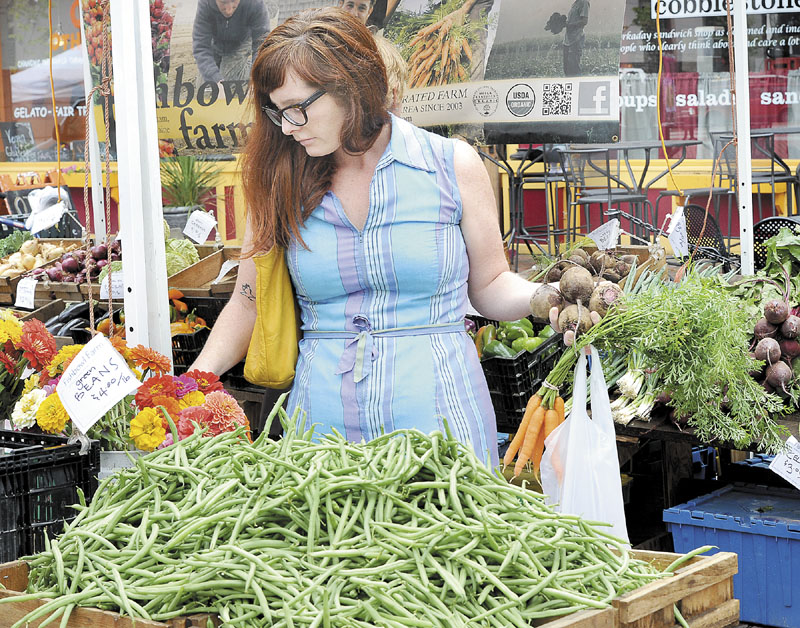Portlanders can show their farmers market some love on Sept. 29 at a major fundraiser featuring local food prepared by staff from the city’s best restaurant kitchens.
Tickets go on sale Friday for “Bunker Down Fest: A Fundraiser for the Portland Farmers Market,” which will raise funds to help keep the market’s token program going.
The popular program, which ran out of funding at the end of August, allows low-income Mainers with EBT cards, as well as people who use credit or debit cards, to shop at the market with wooden tokens that are accepted like cash. The market vendors themselves are not set up to accept electronic payments.
Organizers of Bunker Down Fest say it will basically be a big party thrown at Bunker Brewing, 122 Anderson St., from 2 to 8 p.m. Tickets will cost $25 for adults, or $10 for children ages 3 and up.
The gathering at the East Bayside brewery will include the chance to eat well, rub elbows with local farmers and chefs, play games and listen to local music. Farmers are donating fresh vegetables, cheeses, chickens and whole pigs for an omakase-style spread prepared by some of the town’s best culinary talent. The protein on the menu will include smoked and roasted pork, charcuterie and spit-roasted local broilers.
The Miyake and Pai Men Miyake restaurants have already signed on for the event. So have Sonny’s and Local 188, which are owned by restaurateur Jay Villani, one of the partners in Bunker Brewing.
Bunker is supplying the beer, and organizers are talking to other local breweries about joining in. Tandem Coffee Roasters will be serving coffee.
“Come any time, all day, and there will be chefs cooking all day long,” said Colleen Hanlon-Smith, executive director of the Maine Federation of Farmers Markets. “You get two 8-ounce pours and food with entry. Really, the idea is just to have a great, fun celebration at the tail end of summer.”
Additional pours will be $2 each.
A number of restaurants have also donated gift certificates that will be raffled off during the bash.
The goal of the party, in addition to having fun, is to raise a lot of cash for the market’s EBT program, which converts electronic currency into wooden tokens.
EBT programs open up farmers markets to shoppers who might not ordinarily have access to healthy local foods. Hanlon-Smith said nearly 20 percent of Maine’s population uses EBT cards for SNAP benefits, formerly known as food stamps.
The wooden tokens are also a major convenience for shoppers who don’t want to carry cash to the market, and they open up an entirely new revenue stream for market vendors.
“Given the significant percentage of Maine’s population on food stamps, one can easily see how making it possible for individuals and families to spend their EBT funds at farmers markets would be a huge economic boost to Maine’s local economy,” Hanlon-Smith said. The Portland Farmers Market EBT program began last year, funded by a federal anti-obesity grant, with support from Healthy Portland and Cultivating Community. People using SNAP benefits spent $50,000 at the market in the first year of the program.
Since that grant ran out, the market has been relying on gap funding from the city of Portland’s Healthy Portland program that will last until October.
The market estimates it needs $12,000 per year to continue the EBT program. The money would be used to hire someone to staff the Market Information Booth where shoppers have their cards swiped to buy tokens that they can spend on fruit, vegetables, meats and other foods.
The Portland Farmers Market tried an online fundraiser that ended this week and raised about $2,000.
Hanlon-Smith said that ideally what the Portland market needs is a diversified revenue stream that will operate the market and help it grow. Revenue sources might include increased annual dues for market vendors, continued support from the city, support from farmers market patrons, and local organizations stepping up.
Hanlon-Smith said she’s been surprised by the lack of financial support for the market in Portland, given its popularity and the number of organizations, academic institutions and foundations based here. In cities such as Augusta and Waterville, she said, local hospitals provide financial support to local markets because they “recognize the economic development and community building that farmers markets present to the community.”
“There’s a huge amount of potential” in Portland, Hanlon-Smith said. “It’s just crazy, with one of the most well-attended farmers’ markets, that in terms of having a strategic plan toward sustainability it still has a ways to go, and needs a lot of support from the community.”
Staff Writer Meredith Goad can be contacted at 791-6332 or at:
mgoad@pressherald.com
Corrections: This story was revised at 12:45 a.m., Sept. 7, 2012, to state that the farmers market has been relying on gap funding from the city of Portland’s Healthy Portland program that will last until October.
This story was also revised to state that the Portland Farmers Market tried an online fundraiser that ended this week and raised about $2,000.
Send questions/comments to the editors.



